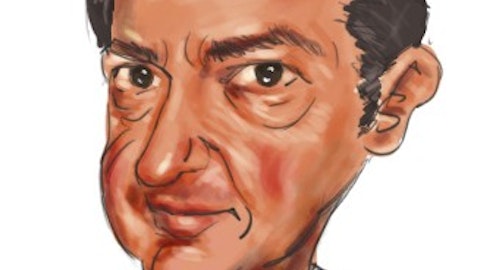Whitney Tilson co-founded T2 Partners with Glenn Tongue in 1999. He manages three investment partnerships – T2 Accredited Fund, Tilson Offshore Fund and T2 Qualified Fund, which is made up of the mutual funds Tilson Focus Fund and Tilson Dividend Fund. Tilson uses a value-oriented strategy in running his funds as well as his other ventures. Since its inception Tilson’s Accredited Fund returned 113.9% cumulative, versus 27.9% for the S&P 500.

Recent years, however, have not been kind to T2 Partners. The fund underperformed the market by roughly 5 percentage points in 2010 (10.3% vs. 15.1%) and lost almost 25% in 2011, versus around 2% for the market (including dividends). Luckily, this fact has not changed T2 Partners’ total assets under management. Its 13F portfolio actually increased from the end of the third quarter 2011 to the end of the fourth ($262.12M vs. $296.08M). The total number of positions in its portfolio also moved up, going from 64 at the end of September to 78 at the end of December.
In February, Whitney Tilson discussed three of these positions with the Young Presidents’ Association. The largest was Berkshire Hathaway (BRKB). T2 Partners had 247,850 shares in the company, valued at $18.91 million at the end of the fourth quarter. In the presentation, Tilson says that he gives the company an intrinsic value of $171,700 a share, plus an extra $7,000 share cash build over the next 12 months and a 5% growth in the intrinsic value of the business means that Berkshire Hathaway has an intrinsic value in one year of $187,285 a share. The company recently traded at $120,000 a share.
In his presentation, Tilson explained some of the catalysts for Berkshire Hathaway’s intrinsic value. He talked about meaningful acquisitions, new equity investments and the ability to win back a AAA rating before too long, but he makes another case for the company that is even more clear – stock repurchases. In the entire history of Berkshire Hathaway, the company has repurchased shares just twice before launching a stock repurchase program in September last year.
Under the terms of the program, shareholders do not have a time limit nor a dollar cap. In addition, Berkshire Hathaway promises to pay a 10% premium over the book value of the shares. Tilson says that this fact just confirms that Berkshire Hathaway stock is deeply undervalued – Warren Buffett would not be buying the stock back at a premium otherwise.
Tilson went on to outline the risk over what will happen once Buffett steps down and the job that once belonged to one man is split. Tilson said that two of the successors to Buffett’s throne have been named already – Todd Combs and Ted Weschler – and he thinks they are excellent investors. And, while they aren’t Buffett – specifically, they lack the experience, reputation and connections, Tilson isn’t worried about it. There are two reasons; the first reason is that Buffett isn’t going anywhere soon – he will be there to complete a long transition – the second is that Berkshire Hathaway is priced so low to its intrinsic value that it is worth the risk. We agree that Berkshire is trading at a discount but we don’t see any of these catalysts unlocking any significant value.
In the presentation, Whitney Tilson also discussed department store JC Penney (JCP). He explained his view of the company very clearly. He said the company is a decent business that has underperformed and been under-managed, that it is valued based on its current performance, that there is room for improvement in a variety of areas and that there is an extraordinary team behind the curtain that can make it happen. Tilson named JC Penney CEO Ron Johnson and Pershing Square’s Bill Ackman amongst others. He thinks that these people will be able to increase sales and optimize capital structure at JC Penney while cutting costs. Tilson explains that JC Penney hasn’t really delivered in recent years but it has been on the rise ever since Ron Johnson, who had formerly been an executive at Apple, was announced as the company’s new CEO.
Tilson says that with all that going for it, JC Penney is priced incredibly cheap. We absolutely agree. According to Yahoo Finance, the company recently traded at 13.77 times its forward earnings, which is higher than rival Kohls (KSS)’s 9.10 forward P/E or Macy (M)’s 9.91 forward P/E, but that’s because its current net income is so low, coming it at just $195 million to Kohls’ $1.17 billion or the $1.26 billion of Macy’s. In turn, estimates about the company’s future earnings are based on its current income, and this skews its forward P/E higher. This is the argument Tilson was making and we agree. With people like Johnson and Ackman at the helm, we think that JC Penney could rise like a phoenix out of the ashes – and that will probably happen sooner rather than later. We recommend JC Penney for investment terms two years out or more.
Whitney Tilson made some gutsy bets on financial stocks when most investors were dumping them. He had long positions in Goldman Sachs (GS), Bank of America (BAC), Citigroup (C), JP Morgan (JPM), and Wells Fargo (WFC). You may have noticed that he bet on mega-cap banks but his two biggest positions are Citigroup and Goldman Sachs. We share the same feelings and have a long Citigroup position in our portfolio. Mega-cap banks have extremely low price multiples and Citigroup has the lowest among these five banks. We expect these multiples go up by 30-40% over the next couple of years. In addition we expect these banks to increase their earnings by around 20% as well. So our estimated potential upside is around 60% for the next 2-3 year period.




